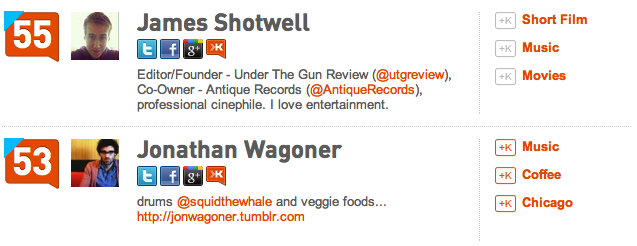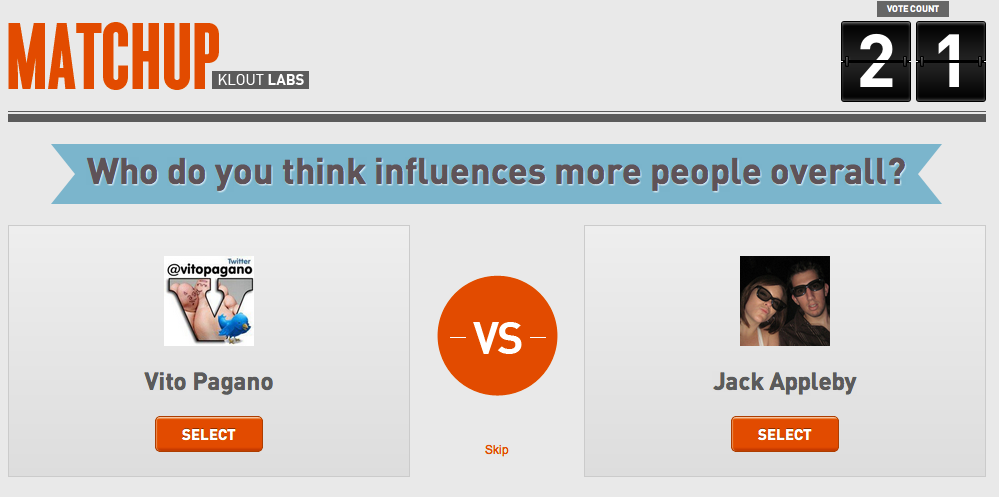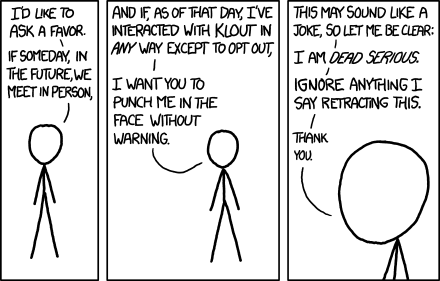
"Have you heard about Klout?"
"No, What is it?"
"It's this great site that tracks your influence online and ranks that influence with a number ranging from 0 to 100!'
"Well that sounds pretty cool! Hey look, I've got a 34. Is that good?"
"Not too shabby, I've got a 53, though."
"Awe shucks... I'll beat you, just watch!"
The above conversation depicts a common exchange of discussion when someone is first introduced to Klout, a social media analytic service open to any Facebook or Twitter user. The goal of Klout's service is to measure an individual's influence across their connected networks and on a variety of topics that are automatically assigned or suggested by peers. Scores are generated by connecting social networks such as Facebook, Twitter, Google+, Linkedin and other services like location based app foursquare, photo-sharing apps like Instagram and flickr, web video giant Youtube, scrobbling resource Last.fm, and blogging titans Tumblr and Wordpress. Klout's algorithms then take the size of a person's network, the content created on that network, and how other people interact with that content and then spit out a number that you can use to brag about online (or offline).
Klout scores range from 1 to 100 or least influential to highly influential. The average Klout score is about 20. This is likely do to the small amount of people who realize the service's existence. You see, everyone has a Klout score whether or not they've even visited the site. Klout boasts more than 100 million profiles built thus far. When a person registers for Klout and begins to add their information, Klout then begins connecting their friend's pages to their databases. The more people the better sample right?
Klout score can be further broken down into 3 measures of influence. "True Reach", "Amplification Probability", and "Network Score" are also on a scale of 1-100.
True Reach is based on the size of a person's "engaged audience" of followers and friends who actively listen and react to her or his online messages. This is normally your family and friends on Facebook who comment on photos of your lunch, haircut, or latest status update.
Amplification Score relates to the likelihood that one's messages will generate actions (retweets, @messages, likes, and comments). This is when you post a funny status or meme on your wall and everyone 'likes' it. Aren't you so clever, Googler? On Twitter, this is normally those who find you humorous or interesting. When you produce interesting content, people are more likely to share your content with their friends and followers. Some will even engage and respond to your content with a comment.
Network Score reflects the computed influence value of a person's engaged audience. Like I said above, when you produce interesting content, people are more likely to share and respond to that content. When the user responding has a high influence, your influence will raise.
In addition to the main Klout scores and the 3 broken down measures above, a June 2011 addition to the site expanded the way people are viewed on Klout by giving them topics of influence. These topics are auto assigned by Klout, but can be added to (at the cost of a few +K) or deleted if you don't think they adequately represent your areas of expertise.
Each day you are assigned some Klout points or +K, the "currency" of Klout. These points can also be earned through achievements as well. With these points, you can indicate that your influencers are, in fact, influential in a specific topic. Simply click on the button next to a topic and their little meter of influence will fill up a bit more.

What is the point in this though? Good question. There are two main uses for these topics. First, there are "top influencers" and "top +K recipients." This is self explanatory, if you are in the top 10 influencers in any specific topic, you get a swanky little gold sash over your Klout score. If you are one of the top recipients of +K in that topic, you will also get a blue sash. You can have one or the other, both, or none at all. It depends on your influence on the subject and how many friends you have on Klout, giving out +K daily.

Secondly, +K is needed for the reception of "Perks" or prizes and offers offered to those who are influential in certain topics. For example:

As you can see, only those who are influential in topics like Audio, Technology, Music, Blogging, and Headphones are eligible to win (I didn't win this one for being too late.) There are a variety of perks offered to Klout users on a monthly basis. Checking back often is suggested, especially if there is a perk you've got your eye on.
This all seems pretty straightforward and legitimate right? Perhaps not. Klout is far from perfect.
The big issue with Klout is the validity and accuracy of the service. Is the score an accurate representation of a person's influence? I think not. Let me provide you with some examples like this one. Barack Obama is the President of The United States of America. He is, by most people's count, the most important man in the world. His influence is massive because, well, he's the President.

Here we have Justin Bieber. If you hadn't noticed, Justin's Klout score is 7 points higher than that of the President's. Now, Is that right? I don't think so. Notice that Barack's campaign staff actually registered his Klout page. That, of course, means he is getting more accurate readings, therefore boosting his score a little. Justin, however, has not registered on Klout, yet he still has a perfect score. Something's not right.

Furthermore, Lady Gaga is one point higher than Barry O. and Nicki Minaj is tied. Both they, Ellen DeGeneres and Taylor Swift are more influential than law makers and government officials like Speaker of the House John Boehner, House Majority Leader Eric Cantor, and all major News Networks. Makes sense right?
A more personal example can be cited as well. I have had Klout for about a year now. I've suffered heavy losses in points after Klout rebooted their scoring algorithms, I've lost points do to inactivity, and gained points after successful articles. I currently sit on a modest 61. I'm proud of those 61 points. I've worked hard for them by being focused on my topics and industry.
In the past week, my social media class took up Klout as a small project. Just another way to get acquainted with social networking. I obviously didn't have to do much. My peers registering with scores of 15 to 20. Those scores would of course rise. That's inevitable when networks are added and tracked. What I'm frustrated with is this:


I joined the service about a year ago. The user above me joined only one week ago. At that time, he had a score of 14. A rise is normal after registration, but one so massive? Surely not. Notice that I have all but one available service activated. My peer only has two. My classmate unknowingly did something I call "point farming." You see, in this example, the user has only been actively using Twitter for two weeks. Not that it should matter much, his network of influence leans 88% Facebook.
Speaking of, let's put together a break down of our social networks. Perhaps we can find the reason for such a massive gain.
Jacob's Twitter Follower count: 798
Classmate's Follower count: 296
Jacob's Friend count: 710
Classmate's Friend count: 5,002
Ah, I think we've narrowed it down. It's because of my opponent's Facebook friend count that his score is higher than mine. This brings me back to my previous point, "point farming." By simply adding more people to see the content, you can emulate a person with a strong influence. Considering that this user (who is also a musician) only has 528 likes on their fanpage, it can be assumed that his influence is, in actuality, much smaller than stated on his Klout profile.
It's not a point of jealousy for me. I'm fine with people having scores higher than my own if it is apparently just. Users, such as my classmate, however can have scores far higher than others (in their field or industry or not) that quite obviously have more influence. Musicians selling out stadium tours can be found with scores lower than a local coffee shop guitarist. Lawmakers have lower scores than bloggers. National television networks are being beat out by local radio stations. That is where we find fault in the system. This is what needs improvement. This is why mockery sites like Klouchebag have been formed.
At least they are trying to improve accuracy. Just yesterday the company released a new way to compare users and improve the influence of some users over others. You can use Klout Matchup to choose who is the most influential between two people. You may judge ten to twenty pairs a day to make Klout a better place.

In summary, Klout factors in statistics like follows, likes, and shares. They do not, however, have a way to judge the quality of content or the more important factors that exist outside of social networking. It's more of an Search Engine Optimization (SEO) guide than a true tool of influence measurement. Klout is constantly reworking their algorithms and ways to count influence, but even with improvements, it can't be 100% accurate. Furthermore, Klout takes time to develop and maintain. It's not something that should be instantly achieved after a several days as a non-celebrity. I'd be interested in conducting an experiment to test the ease of "point farming." Simply creating a new Facebook and Twitter account and adding as many individuals as allowed, while focusing on a select few topics, would be easy. In fact, so easy a bot could do it. In fact, bots do this. It's not that hard.
The point is, Klout is a fun thing to try out ( It's now mobile ) It's fun to compare scores with colleagues, classmates, and friends. It is not, however an accurate source for influence or notoriety. It should not be used in hunts for employees . It should be used for internet bragging rights, and that is all. That said, you can join up on Klout.com and see how you stack up to your friends and family. You can also find me on here (I share +K daily). It's not a perfect service but hey, at least some of the perks are nice.

Further Reading on the topic: